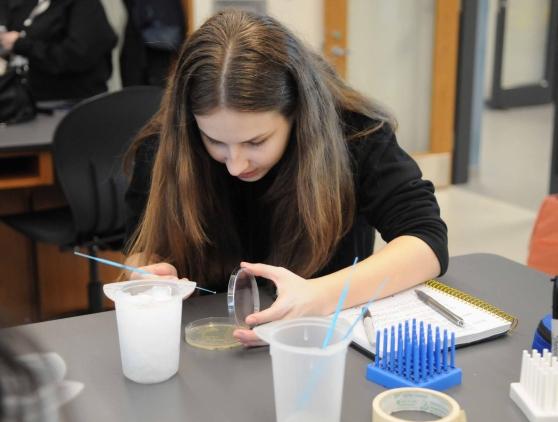A transformative experience

Teacher Paraskevi “Kevi” Langis regularly brings students to the DNA Learning Center.

High school juniors from Gaynor McCown Expeditionary Learning School pick up petri dishes for use during a field trip to the DNA Learning Center in Brooklyn, where they worked with proteins from bioluminescent green jellyfish.
After a class trip to the DNA Learning Center in Brooklyn, high school juniors used fluorescent protein from tiny bioluminescent green jellyfish to create petri dish samples that would soon teem with glowing green dots.
With the help of DNA Learning Center educator Elna Gottlieb, the 27 juniors at Gaynor McCown Expeditionary Learning School transformed bacteria by introducing genes for antibiotic resistance and luminescence into E. coli samples. Back at their Staten Island school two days later, one of the four petri dishes each team created in the controlled experiment glowed green under ultraviolet light.
“It’s cool when the students see those results,” said Paraskevi “Kevi” Langis, who teaches their college-biology level class at McCown.
Langis regularly brings students to the DNA Learning Center that is housed at the New York City College of Technology in downtown Brooklyn. The center also offers great lab experiments in DNA fingerprinting, human mitochondrial sequencing and other topics. Middle schoolers can learn how to use enzymes to make cheese and applesauce, use household materials to extract DNA from wheat germ and build a bioreactor that removes lactose from milk.
“These are basic techniques used by biologists for all different reasons,” Langis said of the work they do at the center. “It makes such a difference doing it and seeing it versus just reading about it.”
Langis said she has an incubator in her classroom, where the bacteria could grow to complete the experiment, but not some of the other tools used in the state-of-the-art lab. “The pipettes that they use, we don’t have; the machines in back that they use for immediate heating and cooling, we don’t have,” she said.
Cold Spring Harbor Laboratory established the first DNA Learning Center in Suffolk County in 1988. Since then, it has expanded to three additional locations: the Brooklyn center, and labs in Harlem and Westchester County. Each year, 30,000 students in grades 5–12 participate in experiments at one of the centers or receive lab instruction at their school from its educators.
During the lab on March 5, Gottlieb told students to think of DNA as a cookbook for life, with genes as the recipes and proteins acting as the ingredients to build or influence traits and characteristics. In their experiment, they would transfer a protein that’s made by the jellyfish into other creatures.
Gottlieb had the students gather around her workspace to demonstrate each step in the lab before they did the step with their partners. She taught them how to use micropipettes, which measure the volume of small amounts of liquid, a lab hot bath and other skills they used in the experiment.
Amyiah, one of the students, said the trip was a great hands-on experience. Students had access to more resources than they have at school and had 150 minutes to complete everything, compared with a 45-minute class at school, she said.
“It was an overall really cool lab because we got to use micropipettes and then transfer stuff and work with a partner, and I feel like I understood everything because the information was presented very clearly,” she said.
In the post-lab discussion, Gottlieb projected a slide with mice that had luminescence in different parts of their bodies. Scientists had introduced a glow-inducing gene into cancer cells that were implanted in mice embryos.
Eli, a student who is considering a career in the sciences, possibly as a surgeon, thought about the potential applications for cancer surgery.
“Are we close to human trials? Because that would be really useful,” he asked Gottlieb, who said she was not aware of anything but encouraged him to research practices at prominent cancer hospitals.
“We know that if it is advancing, it could help so much with surgeries and procedures — the accuracy,” Eli said after the lab.
The DNA Learning Center offers in-person labs and virtual field trips throughout the school year at all its locations, including the DNA Learning Center NYC in Brooklyn and the Harlem DNA Lab. Standard in-person labs for high school students cost between $575 and $750 per class. For middle schools, teachers can choose one or a sequence of labs, or an extended-day visit, with the cost ranging from $375 to $800. Scholarships are available for Title I schools. For more information, visit the DNA Learning Center or call 516-367-5170.
